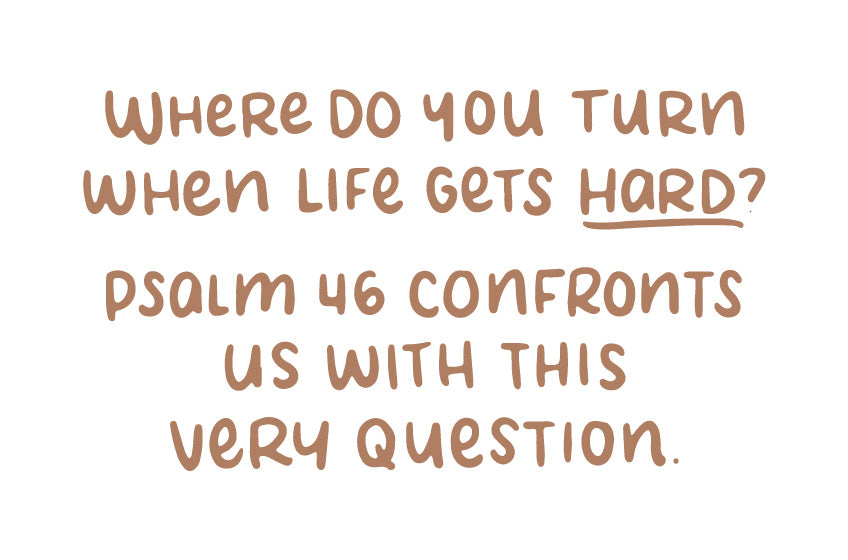“A mighty fortress is our God, a bulwark never failing; our helper he, amid the flood of mortal ills prevailing.”
So begins Martin Luther’s hymn, “A Mighty Fortress is our God,” a hymn that has been loved by Christians for the past five hundred years. When you read the lyrics, it’s not hard to understand its popularity. The hymn is a defiant proclamation that God will prevail over all forces that oppose Him and us, His people. It is a celebration of the reality that in God’s presence, we are safe. And it is a song that captures many of the same truths found in Psalm 46 from which Luther took inspiration.
An Ever-Present Help (Psalm 46:1–3)
Psalm 46 begins with the declaration that “God is our refuge and strength, an ever-present help in trouble” (Psalm 46:1, NIV). It then moves on to describe a situation in which refuge is necessary: the earth is trembling, and the mountains are falling into the seas (verses 2–3). Mountains here are a symbol of permanence and stability. And in biblical times, the waters often represented chaos. “Thus,” writes commentator Tremper Longman, “to envision the mountains being overwhelmed by the waters is a metaphor that points to the ultimate nightmare…” (Longman, 204). In other words, verses 2 and 3 represent a worst-case scenario!
And yet…
The psalmist writes that “we will not be afraid.” Why? Because of what was said in verse 1. Even in the most serious of crises, God is present. And His presence means ultimate security for His people.

God is Within His City (Psalm 46:4–7)
A similar point is made in the next stanza of the psalm. The crisis here is that “the city of God”—Jerusalem—is being threatened by armies. Though threatened by nations and kingdoms who are possibly laying siege to Jerusalem, these verses describe a city that rests easy because of the One who dwells within it. While even “the mountains topple” (verse 2), this city will not, because “God is within her” (verse 5).
The imagery of security is piled up with references to a river bringing delight to the city (verse 4) and to the “Lord of Armies” being with His people as their “stronghold” (verse 7). Those who dwell in this city are safe, not because its walls are so high or its military so skilled, but because God’s presence is there.
Be Still (Psalm 46:8–11)

The theme of security carries on into the final stanza of the psalm, in which we are now invited to “Come, see the works of the Lord…” Whereas we saw God shield His people from external threats in verses 4–7, now we see Him remove all such threats completely by disarming His opponents and destroying their weapons, thus causing wars to cease “throughout the earth” (verse 9). And in this context we come to the much-beloved words of Psalm 46:10: “Be still, and know that I am God” (NIV).
“Be still.” These are words of dread to God’s enemies and comfort to His people. To the nations who would attack God’s people, “Be still” is a rebuke from God; it is His way of saying, “Don’t even try it.” That’s why some translations render this verse as “Stop fighting” (CSB) or “Stop striving” (NASB). But to God’s people, these are words of reassurance; words which again reinforce the security that is found in God’s presence.
Being Still Today
Where do you turn when life gets hard? Psalm 46 confronts us with this very question. And in no uncertain terms, it proclaims that at the end of the day, the safest place to be is in God’s presence. That is what it means to “be still” in our own times: to remind ourselves that He alone is our true, ever-present refuge, even in the midst of worst-case scenarios. Whereas Jerusalem’s security was tied to God’s presence within her (in the form of the temple), God now dwells within us, because we are His temple (1 Corinthians 3:16–17).
This does not mean that we won’t experience trials and suffering today. We will. But Psalm 46 reminds us to turn to God in the midst of them; to pray and bring our concerns to Him. And it helps remind us that if God is with us, nothing that comes against us will ultimately last. Since God will one day disarm all that comes against us, we will come out on the other side of suffering into a world completely free of conflict and pain, a world in which we will dwell with God forever (Revelation 21:1–4).
May we then “be still” today by reminding ourselves—and each other—of this beautiful and life-altering truth: God is with us.

Additional Resources:
Bibliography:
Longman III, Tremper. Psalms. Tyndale Old Testament Commentaries. Downers Grove: InterVarsity Press, 2014.
Luther, Martin. “A Mighty Fortress.” Translated by Frederic Henry Hedge. Hymnary.org.

